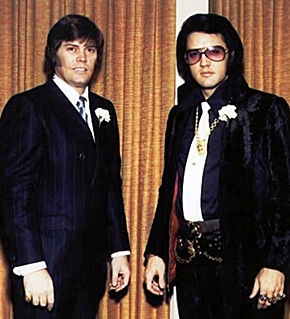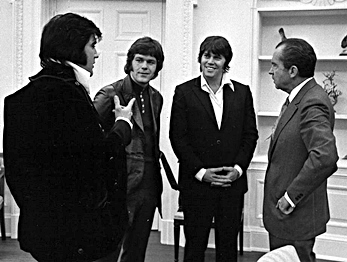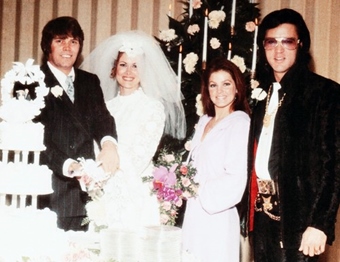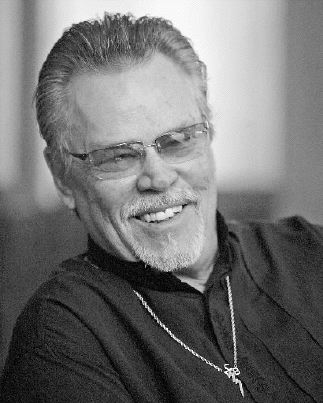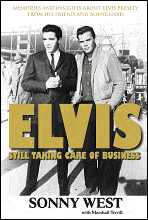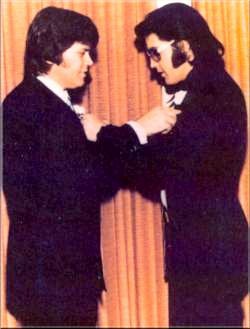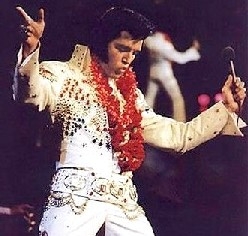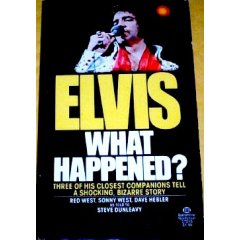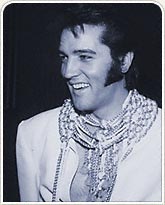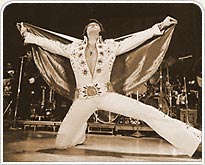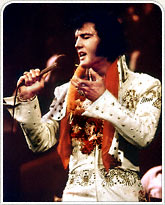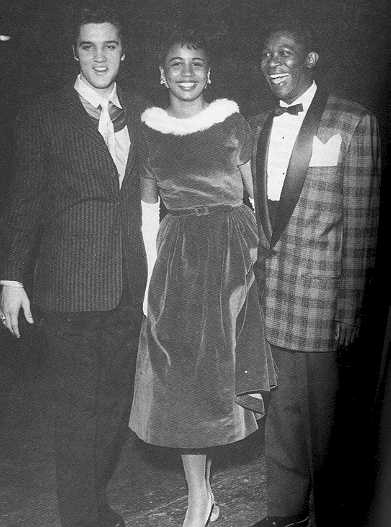 |
 |

EIN thanks Marshall Terrill for facilitating this interview for EIN. Buy Elvis: Still Taking Care of Business from Amazon See below to buy autographed copy direct from Sonny Read Part 2 of Sonny's interview
EIN: Sonny, great to talk with you! Are you looking forward to this year’s huge Elvis Week? SW: Yes I am. That is always a special time for me as it is when fans worldwide honor him and pay their respect to him. It is a time for me to reflect on what he meant to me. EIN: You will be in Memphis promoting your new book, Elvis: Still Taking Care of Business . Where can fans find you during Elvis Week? SW: I will be in Memphis August 11 th through the morning of August 14th. I will make the first appearance at Bill Burk’s Elvis World luncheon on August 12th from 1:30 to 3:30 pm. Later that day, I should be at the Days Inn at 3839 Elvis Presley Blvd. in the Lobby from 6 pm to 8 pm for a book signing, then at the Crossings (Tent area across from Graceland) sometime around 9 pm to say “hi” to my dear friends, Danny McCorkle and Christopher Drummond, and the fans. On the 13th I will be at the Clarion Hotel on Brooks Road from 11 am to 1 pm signing books for friends and Elvis’ fans in the lobby, mostly from the UK and other parts of Europe. From 2:00pm until 4:00 pm I will be at the Peabody Hotel. Later that evening, I will be at the Davis-Kidd Booksellers at 387 Perkins Road Extended doing a book signing between 6 and 8pm. Hopefully, on Tuesday, August 14 th , I will be back at the Days Inn doing a book signing it the lobby along with Sandi Pichon and Jeanne LeMay Dumas with their new books. Although I will only be able to have an hour or so before having to catch a plane to New York, Sandi and Jeanne will be there until 5pm. On August 15th I am going to be on the Fox News Network on the Fox And Friends Show, sometime between 7am and 8am. The next day, August 16th , I will be on Shepard Smith’s Studio B Show at 3:45 pm, then off to England to be a Special Guest and sign books at a 30th Anniversary Party at Pride Park Football Field on Saturday, August 18th . The next day I leave for Berlin to begin a special two week show dedicated to the memory of Elvis at the Estrel Hotel there. I will be reuniting with renowned Producer Bernhard Kurz with whom I have worked with for several years, sometimes two engagements a year, once for Elvis’ birthday tribute and again in August in memory of the anniversary of his death. I have affectionately given him the title of “Producer Extraordinaire”, because of his integrity and skills as a Producer. My participation will in the show will begin on August 22nd and run for two weeks, ending September 3rd. By the way, since you have so many readers world wide, I would like to announce to those in Europe, not too far from Berlin of a Special Event that Bernhard is also bringing to Berlin the King’s Ransom Exhibit, opening on the 13th of August and closing on September 1st. It is the first time for the exhibit to be shown outside of the USA where it has been touring. It is a collection of Elvis Presley’s personal items, such as clothes, jewelry, bedspread from Graceland and many other items that were connected to him from many events in his life. This collection has been accumulating for over 25 years and has over 100 items on in it. This is really something that your readers in that part of Europe who are not going to Memphis should take advantage of this opportunity to see some of Memphis brought to them. It really is a great Exhibit. I plan to go down there some days also and visit with fans that come there. Maybe I will see you there. The King’s Ransom Exhibit will be at the Arlington Hotel in downtown Berlin. Also, I would like to point out that a recent excerpt from “another book” by Joe Esposito, stating new revelations of his being honest and “straight up” about everything. (really?) It also states at one time or another we were all fired and had we just waited, everything would have been alright and we would have been brought back into the fold. First of all, this book was not a “revenge or get even” attempt at Elvis over our firing which seems to be the thoughts of some of the other guys in the group. The same ones which have spoken out against us for doing the book were denying at the time Elvis' prescription drug habit was true. Today they have all written books, done interviews, stating now what we stated while Elvis was alive. We know what our motivation was when we wrote our book about his addiction problem. The question is what is theirs for writing it today? The reason given by one of them is he has come to the decision of finally wanting to be “straight up” and honest. And in reference to Joe’s statement of his thoughts at the time regarding Elvis’ reaction to the book as being “a mountain he may not be able to climb.” That was not the mountain. Elvis was already on that “mountain that he may never climb” and it was much bigger than the one Joe was inferring. I am referring to Elvis conquering his addictive nature as his mountain to climb. Our book was meant to be a catalyst to begin climbing that mountain, and Elvis could have if he had just recognized the fact that he needed to. EIN: There have been so many books about Elvis released. How does Elvis: Still Taking Care of Business differentiate itself from others? SW: I feel that I have tried to give a more personal insight to Elvis that the fans want to know, and feel I was successful in doing so. Of course, that will be up to the readers to decide. So far that has been the case for the ones that have commented about the book to me and on postings in the Elvis world. It is my memories of my life with him, the ups and downs that occur between friends in a span of over 16 years. Of course, one of the “friends” being Elvis Presley does indeed play a big part of why people want to read books written by those close to him. EIN: What else would you like to tell our readers about Elvis: Still Taking Care of Business? SW: It is written with a deep love and respect for someone I spent most of my young adult life, protecting and giving everything I had to make his life better and safe as I could. EIN: Your new book has been on sale now for a few months. How are sales going? SW: They seem to be going very well. I haven’t heard any numbers from the publisher or anything like that, just that many people have told me of the bookstores running out of copies and ordering more. Sales figures usually aren't released until six months after its initial release. EIN: How can fans buy Elvis: Still Taking Care of Business? SW: They can buy them at bookstores around the USA, on Amazon.com, but I am not sure of the name of the bookstores in the UK and other countries where they can buy them. Or they can buy personally autographed copies directly from me by going to Paypal and pay to my account epbgtcb@comcast.net the amount of US$53 for International Global Priority or US$37 for Priority Mail in the US, both prices include the price of the book and S&H. Put “for book” on the subject line, and remember to give the name for the inscription in the note section on the Paypal page. Also, they can email me at: sonny@westwindproductions.us if they wish to email me their thoughts after reading it. Do not use the Paypal link on my website as it has a problem accepting payment for the new postal rates increases for the USA and International. I will be leaving on the 10 th of August and won’t return until the 6 th or 7 th of September, so if they want it shipped to them before that, I need to have the payment notification from Paypal by August 9th. EIN: You recently appeared with an Elvis Tribute Artist, Pete “Big Elvis” Vallee, to promote the book. A number of fans were surprised at this. What was your thinking at the time? SW: You know, I am surprised that question and the reaction of people out there to even come into play. I heard of some fans on chat rooms or postings about that event. The judgmental fans out there that came up with questioning my thoughts of appearing with a young man that has a weight issue, and has been working very hard over the last few years to correct it, is something that really irritates me. He has succeeded in doing so by losing over 300 pounds. Who do they think they are? I am not questioning their rights to think about issues, I am questioning, that after doing so, they come up with thoughts that should have been eliminated by a reasonable process. Pete Vallee is a fine young man, very respectful of Elvis’ memory and his act is a tribute to him. He has a very good baritone voice that is strong, and he uses it to it’s finest in singing Elvis’ music. Some of the fans (most of them) are the same ones that have been “bashing” me, Red and Dave for 30 years. Fine, that is your prerogative. But to exercise that right regarding a person like Pete who has not done anything to offend anyone is WRONG! I tell you this, folks. Elvis would have none of it if he were here today. Period.
EIN: Before we talk about Elvis, we’d like to find out more about Sonny West the person. Who is Sonny West? SW: Sonny West is Sonny West. Like many others my age, who grew up in the depression era, the ‘50s era, we feel fortunate to still be alive and in this world. I was born in Memphis and raised to be respectful of my elders and to be considerate of others. I grew up in a very rough neighborhood, with the “toughest gang” in Memphis, a government housing project called Lamar Terrace. I have always disliked “bullies” and protect others from them when the opportunity presented itself. I was raised in a large family of six children and I was the first born son, but the fourth child. When I left high school, I went into the Air Force, got out and came back to Memphis. I got a job with Ralston-Purina Company then changed jobs and went to work at Ace Appliance Company, repairing appliances, which is where I worked until I went to work for Elvis in April of 1960. EIN: Apart from promoting your new book, what is Sonny West up to today? SW: I am Executive Producer on a proposed reality series for television that is in the developmental stage right now for a pilot. Hopefully it will be on the air next year. Our target date to begin taping is sometime late this fall or early next year. I believe it will be highly entertaining family show and one that people around the country, as well as around the world will enjoy watching. I also do shows with different promoters around the world, telling of my life and times with Elvis, and working with Elvis Tribute Artists. I personally believe they really help project the image of Elvis and help introduce new fans to him. There are many that do a nice tribute to him, and as long as they realize who they are, and who Elvis is, I don’t have a problem with them. But once they are off of that stage, don’t try to talk or act like him. I won’t stay around and listen to it.
EIN: What does Sonny West do in his spare time? SW: What spare time?! (LOL) Elvis still, in his own way, keeps me pretty busy with personal appearances and my shows. I spend time with my family, play a little golf, and I mean a little. I get to spend some time doing nothing, which really feels good at times. EIN: Besides Elvis, who are your favorite singers? SW: I absolutely have a favorite in Celine Dion. I have stated in my book that I believe she would be one of Elvis’ also, if not his very favorite. The first time I heard, The Power Of Love, I was driving my daughter, Alana, to school, and I turned the volume up. When the song ended I told her that song was going to be a big hit, along with the lady that sang it. She still remembers that to this day. Of course, there are others I really like, Shania Twain, Tom Jones, Elton John, Roy Orbison, Frankie Valli, Jackie Wilson and Connie Francis. Actually, there are really too many to list all of them. EIN: And your favorite actors? SW: Gene Hackman, Clint Eastwood, Dustin Hoffman, Jon Voight, Russell Crowe, James Woods, Kurt Russell, Denzel Washington, Mel Gibson, Sidney Poitier, Robert DeNiro, Al Pacino, Marlon Brando, Christopher Walken and many others. Then there's the immortal James Dean that was my favorite in the '50s. EIN - A Sonny West (supposedly from Lubbock, Texas.) recorded a couple of 45 rpms for Altantic in 1958 including Rave On . Some information books have suggested that this might be you. What do you know about this other Sonny West? SW: He is a songwriter/singer that I know little about other than we have the same name. There have been more than a few people that have asked me if I was the same guy, to which I sing a line or two, and then they know that I am not. Just kidding! No, but really, I don’t know anything about him. EIN: Have you traveled much outside of the US? SW: I have traveled to England, Germany, and Australia. I look forward to returning to England and Germany this summer. Also, I hope to travel to Denmark and Switzerland this fall in October, and possibly other countries in the future.
EIN: Have you considered patenting it? SW: LOL She is the patent. I am sure there are others out there that have the same patent pending.
EIN: Elvis: Still Taking Care of Business is of course your second book about your time with Elvis. In 1977 fans were overwhelmingly critical of Elvis: What Happened? In 2007 many now see the book in a different, more accepting, way. How do you look back on its publication? SW: I am still upset that what we were trying to do was misinterpreted as a “get even” with Elvis for firing us, or “we did it for the money”. Neither could be further from the truth. Simply put, we knew Elvis - the people who criticized us did not. Elvis lived up to every challenge put to him and over came them. We thought he would do it again. While working for him, we had access to him to confront him regarding what he was doing to himself. Once we were fired, we had no access. The book was to try to show him, in no uncertain terms, what he was doing to himself and to those around him who loved him. Regarding the things told in the book about what he did in the '60’s was also said for the same reasons. When he was taking diet and pain pills that played with his emotions, including his volatile anger, he did or said things that he normally wouldn’t do. Elvis became someone else under the influence of certain medications, including cortisone, which is a steroid and can make you irritable and somewhat aggressive in your behavior at times. But none of these were written about with compassion or understanding or concern. The writer, Steve Dunleavy, was assigned to write the book by World News Corp., whom we had signed the contract with for the book. He wrote for The Star weekly publication, which was owned by World News Corp. at the time. He felt none of the emotions I previously mentioned when writing, so they didn’t appear in the words as he wrote them. More than once, we had to take breaks as we were brought to tears at the sometimes painful thoughts of our remembrances.
EIN: Sonny, you say in Elvis: Still Taking Care of Business that Elvis: What Happened? was largely a failure. What do you mean by this? SW: That the intention of the book didn’t happen. Elvis did not meet the challenge. If he had, we would have been made to look like liars. But, in order to do that, Elvis would have had to stop what he was doing, get off of the drugs, and show the fans that he was not under the influence of prescription medication. He did that in Las Vegas one time when a bellhop said the Elvis was “strung out on drugs.” That statement got Elvis very mad. He straightened up very fast and put on some great shows with the energy that his fans were used to seeing from him. He also threatened the guy while on stage, what he would do to him if he found which bellhop said it. That statement is actually on a CD that is out there in the Elvis world, and many of the fans have heard it. EIN - Dave Hebler only worked for Elvis for a couple of years 1973 -1976. Did he have the right to participate in Elvis What Happened? when he only had bad things to say and no reference to the early years of the good times with Elvis? SW: You know, Dave has been maligned, I feel, by people because he was around for such a short time. But you need to think about that short time, and when it happened to be. It happened to be when things were starting to slip a little bit. Dave cared very much for Elvis, and not being around for a long time doesn’t mean as much as a lot of people think. You did not have to be around Elvis long at all for you to be touched by him in such a way that it changed your life forever. Just look at the fans that never met him, or even saw him in person and look how their lives have been so profoundly touched and changed by him. You may not have heard the years that Red and I had with Elvis in Dave’s words, but not being there in the early years didn’t mean that he didn’t have some wonderful memories of some good times when he was there. Dave expressed, maybe in an analytical way, but certainly in a caring way, some issues that concerned him about some of Elvis’ behavior. All of us had different personalities, and Dave, for those of us who know him pretty well, has a very analytical mind. I consider him a dear friend and one that I would like to have covering my back. As far as having the “right to participate in EWH”, it had nothing to do with “the right.” It had to do with the fact that he was there and was concerned about Elvis' declining health. He participated in trying to help Elvis. Period.
EIN: You were with Elvis from 1960 to 1976. This is a substantial part of your life. How did you handle news of his death? SW: It was a substantial part of my life, and one that I truly enjoyed living. I didn’t handle the news of Elvis’ death well at all. I was devastated and just fell apart. Other than my cousin Red and his wife Pat, I didn’t talk with anyone that day except my wife. I couldn’t. I cried most of that day and into the night. I wandered from room to room in our home, asking why, thinking only about the good times that we had shared over the years. The hope that he was going to get straight was lost. It wasn’t going to happen and I just felt so empty. I didn’t sleep that night, and then the next morning, watching the show, Good Morning America, with Dunleavy and Geraldo Rivera on the show, going after each other with personal attacks, and then both giving their comments about Elvis enraged me. Neither knew the man. Dunleavy only knew the things we told him and Geraldo stated that he had met the man on several occasions and that “he was as straight as anyone in this room.” He then stated that he was sure “there was a flirtation with drugs, as it is the nature of the business”(entertainment) but, to call him a junkie, is just a lie” I believe is an accurate quote. As it turned out, Geraldo admitted in his book, “Exposing Myself,” he met Elvis only once, and that was a 10-minute backstage interview at Madison Square Garden. That hardly qualifies him as an Elvis expert, don't you think? We never called Elvis a junkie and I put in a call to our attorney to see if he could get a press conference held in his office later that day, which he did. That is the one that Dave and I participated in, as Red was working on a TV series. That is when Dave came up with a statement that lays it on the line when asked by a reporter about doing more to protect Elvis from taking drugs. Dave replied, “How do you protect someone from himself?” One final thought on this subject. A couple of years later, Geraldo used all of the resources and power of a top-rated investigative television series, “ 20/20,” and exposed Elvis’ prescription drug problem on one of their weekly segments. As far as I know, he still has never acknowledged that we were telling the truth, and/or apologized for calling us liars. EIN - Did you always travel with the gang to Elvis' films sets? How many films did you appear in? SW: I worked one way or another on most of Elvis’ films. Either with him, as an extra, in a fight scene or as an actor. I don’t remember how many films exactly. We had a lot of fun during those years. They were my favorite years with him. EIN - Did you ever spend time alone with Elvis and get to know him on a close one-to-one basis? Did he ever confide his fears or loneliness to you? SW: We had some times alone, as probably most of the guys did at one time or another. A lot of our conversations occurred when it was just the two of us in the car driving around. Sometimes at home when there wasn’t anyone else around, which didn’t happen too often. I have to tell you, he never spoke of his loneliness as something that was on his mind. I will say though, that he could appear to be the loneliest person in the middle of a large crowd. At times, there was a feeling that he gave off that appeared to be very vulnerable. It was at these times that I felt most protective of him. When I started to work for him, I was 21 years old and, though having been In the Air Force, I was still a little wet behind the ears. I looked at him as a “worldly” big brother, showing me what life was all about. But near the end of our time together, I felt like I was the big brother, looking out for my little brother. The biggest concern, other than the death threat in Vegas, was losing his voice, and not being able to sing anymore. That was a very big concern of his in Las Vegas, where the condition referred to as “Vegas throat” was because of the arid desert air would cause problems for singers. One night when he totally lost his voice while on stage at the Hilton in Las Vegas, there was pure panic on his face. He was very scared, as we all were, as we didn’t know what was wrong, or if it could be a permanent condition, or what. After that incident, he did whatever it took to keep his throat moist. There was one time, regarding time alone with him, that sticks out in my mind and means so much to me. It was a brief moment with him in the kitchen of his home on Chino Canyon, in Palm Springs. My room was next to the kitchen, and when I heard some noise in there, I got up to find Elvis browsing around in there looking for something to eat. I offered to fix him something, whatever he wanted, or go get something for him. He stopped for a second, turned and looked at me, then said, “Sonny…I love you man.” That simple statement from him touched me so deeply. I said, “Thanks boss, I love you, too.” He replied, “I know that.” Then he turned and continued to search for something, and said, “It’s one of those times when you have a taste for something, but you don’t know what…you know what I mean?” I told him I did, and continued, “Well, if you decide on something that you want fixed, let me know, okay?” He said he would, we exchanged good-nights and I went back to my room. A few minutes later, it was quiet in the kitchen. I forgot to ask him the next day, did he find anything to eat or not. He may not have decided on anything. EIN - How did things change for you when Priscilla arrived at Graceland? SW: Well, not much at first, other than watching our language in case she was in earshot. Also the content of our conversations changed somewhat when she was around. But eventually, things began to change, and in some ways, rightfully so. She wanted more time alone with him, but it was hard to get Elvis to do that. He liked having us guys around most of the time, and there were times that it was an issue between them. She kind of blamed us for that, but it wasn’t our doing. I think she realizes that today in retrospect. Not long after they were married, about a year or so, they moved into a smaller home on Hillcrest Drive in in Beverly Hills. There was less room for the guys to stay there, thoughts of giving her a little more private time with him I suppose.
EIN: You and Judy were permanent residents at the Monovale house in LA. What are recollections of your time there? SW: After the murders of actress Sharon Tate and Jay Sebring (whom Elvis knew), which were later found out to be committed by the Manson Family, Elvis told Priscilla to look for a larger home because he wanted me to move back into the house. She found the home on Monovale Drive and Judy and I moved in with them. Then our son, Bryan, was born a couple of years later lived there until he was almost a year old and then we moved into a home that was only about fifteen minutes away. By then, Charles Manson was in prison and so were his drugged out disciples who murdered for him, and things had settled down a little. EIN: What are your greatest memories of your time with Elvis? SW: There were so many, it is really hard to pick out a few. There were certain ones like meeting President Nixon, Muhammad Ali, just hanging out with Elvis and celebrity friends of his on the movie sets, in Vegas, Tahoe, and while on tour. EIN: Do you have any regrets about your time with Elvis? SW: Not being able to reach him when it counted most near the end. Otherwise, it was great just being around him. EIN: By the mid-'70s Elvis’ psychological and emotional state was erratic. Why do you believe he lost his way on a personal level? SW: I believe Elvis was getting progressively more apathetic towards life off the stage beginning in 1975-76. He loved performing, but doing other things that he once enjoyed so much seemed to fade away. His interests in activities just wasn’t there. In that last year or so, he only spent time with his cousin, Billy and his wife, Jo, and of course Ginger, or another woman when she wasn’t there. My last really good time with him was in January of 1976 when we went to Vail, Colorado for 10 days or so and celebrated his 41 st birthday. EIN: At the time Barbra Streisand offered Elvis the co-starring role in A Star Is Born , was he really in the right state of mind to handle the role? SW: Not at the time she met with him, but he could have gotten in to the right state of mind if he had made the commitment to do so. It would have been very challenging for him, but he could have done it. He was very convincing when he told us that he was going to do the movie, and shook our hands on it to show his sincerity. But two or three days later when he started making little snide remarks about dealing with Barbra Streisand on the movie, and a remark about Jon Peters, her partner, some of us knew he was not going to do the movie. Red and I looked at each other and just shook our heads as we listened to him. He told Colonel Parker he had changed his mind and to get him out of it. The Colonel did just that, then took all the heat was on him, which stopped Elvis from doing the movie. It was just another time that the Colonel was blamed for something he supposedly did to harm Elvis’ career. EIN: Sonny, did Elvis have a self-destructive personality? SW: No. He did some challenging things in his life, but nothing to me that indicated a self-destructive disorder. He knew when to back down from a situation that could get him into a place that he didn’t really want to go. I really believe the only problem Elvis had was an addictive nature. You could see that sometimes in other parts of his life. If he had not had that addiction he would have been just fine. He just couldn’t beat it. My brother Billy was a very strong individual, and I mean strong. He was president of a motorcycle club in Memphis for many years and ran that club with an iron fist. But he had an addiction to gambling, and he couldn’t beat it, and it cost him his life.
EIN: What was the scariest experience you ever had around Elvis? SW: When he had a death threat in Las Vegas. It was an extortion attempt, but at the time it was a very real threat, and the FBI was called in on the case. They did a profile on the person, and considered him to be a disturbed individual that would very likely follow through on his threat. They said he would want to get caught for his claim to fame. Well, wouldn’t you know, that while I was in a strategic place on the stage, there would be somebody that fit the profile in my area of responsibility in the audience. He was dressed in a dark suit with sunglasses on and was constantly looking around, paying little attention to Elvis on stage. He did not applaud one time when others in the audience did. I thought, that’s got to be the guy. I was very intense the whole show, watching him closely. I can not tell you how scared I was, thinking the whole time, if it is him, will I be able to get to him before he can get a shot off at Elvis? The end of the show finally came and as he stood up with the rest of the audience, he reached for his coat pocket, and I was a split second from diving on him from the stage, when he pulled a handkerchief from his pocket and wiped his brow. Man, that was intense. We found out that he was just a “high-roller gambler” whose wife had made him sit with her at the show instead of letting him be where he really wanted to be, which was in the casino. He was obviously not an Elvis fan like his wife. Also, that feeling of what to do, even if you are carrying a gun yourself, when a gun is already in someone’s hand and pointing at Elvis. I began practicing a fast draw until I felt that I was fast enough to be successful in drawing it fast enough to possibly save his life in the event it should ever happen. EIN: And the most satisfying experience? SW: Again, a very hard thing to claim as there were many. One that does stick out was when he gave an electric wheelchair to an elderly black lady that lived in the same general area where he grew up in North Memphis. There was an article in the newspaper, which Marty Lacker read and brought it to Elvis’ attention. Elvis read it and simply said to find out where she lives. He and several of us guys and Priscilla, took it to her home and Elvis’ presented it to her. There were tears all around. I have to tell you, the way he was with her, so respectful and warm, it was a wonderful time to see what Elvis was really all about as a caring and decent person. EIN - We know of Red's final phone conversation with Elvis. What was your last contact with him? SW: My last contact with him was on my birthday, July 5, 1976. It was in the foyer of Graceland after we had just done a show at the Mid-South Coliseum to end the tour we had been on for the last 12 days or so. I said goodnight to him and for him to get some rest and I would see him in a few days. As he began going up the stairs to his bedroom he said he was and then said “Happy Birthday” to me. I thanked him and told him Judy had baked a cake for me and did he want some? He answered, “Oh yeah. Linda’s going to bring some up. Goodnight.” I never saw him or spoke to him again. I called his home in Palm Springs, I believe it was the next day after Vernon had notified me of my dismissal but he wasn’t up yet, according to one of the guys I talked to that answered the phone. The next day when I called back and the number had been changed. A few days later, Dave Hebler found out that Elvis had left Palm Springs and gone to Las Vegas to stay at Dr. Ghanem’s home. The doctor answered the phone and I asked if Elvis was awake yet. He said yes he was, and that he had just finished eating. I asked him to ask Elvis if I could talk with him for a moment, which he did,(I suppose). Dr. Ghanem came back and said Elvis didn’t want to talk to me. I suggested Elvis might be thinking that I was going to ask for my job back, so I asked the doctor if he would explain that wasn’t the case at all, I just wanted to know the real reason that I was fired. I even told the doctor he could ask him and tell me Elvis’ answer, that Elvis didn’t need to talk with me if he didn’t want to. Ghanem got back on the phone and told me, Elvis didn’t want to talk about it. I told Dr. Ghanem, “Well, please tell him I won’t be calling back.” I have to tell you, I was hurting.
Read part 2 of his interview with EIN, where Sonny talks about:
Feedback Cris: just wanted to say.....GREAT INTERVIEW ON SONNY WEST!!! He is bar none, the best thing that ever happened to Elvis! Thank you Sonny for being so caring to our beloved man all those years! Sam Thomas: Cool interview! Looking forward to part 2. Sonny is a real gentleman and one of the only MM members not to have changed his story over the years. Jeanne Pellicani: THANK YOU for this wonderful interview! I can't wait to read the second part. I enjoyed Sonny's latest book very much, and I've always felt that he had a great deal of love and respect for Elvis. That love and respect comes through in this interview. Penny K: Top interview with SW. I've always thought he was oine of the best MM guys. Can't wait for part 2. Jason: Sonny tells it like it is! He's spot on about Diamnond Joe who's changed his story more times than a model changes clothes. Peter B: EIN keep it coming. Love your site and the wide variety of interesting items you offer fans. Your content is much wider than any other site. Sally Jenkins: Good on Sonny West. He seems like a real nice guy and an honest one too. Its sad he didn't get to say goodbye to Elvis.
|
|
